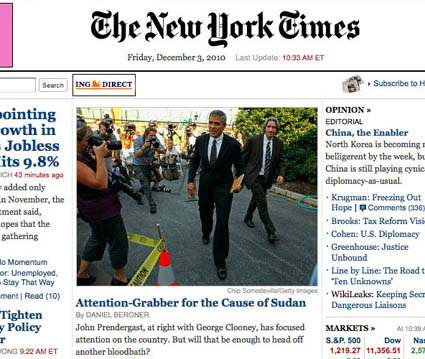With more than a little help from our friend George Clooney, the media spotlight on southern Sudan continues with two primetime features tonight and this weekend: NBC’s "Dateline" and The New York Times magazine.
NBC’s “Inside Dateline” news magazine previewed tonight’s 10 p.m. EST broadcast:
"For what may be the first time in history, our cameras aimed to document a war of potential atrocities, possibly even genocide, as it unfolded in real time," explains NBC News' Ann Curry. "No one is more serious, or as clued in to the potential risks in Sudan as George Clooney; not only as an actor, but as a human rights activist. This 'Dateline' hour offers a rare glimpse of the real world, and of a man who cares honestly about these people who have no voice, except the one he gives them."
"Dateline" cameras follow Clooney on his whistle-stop tour across the U.S., with John Prendergast—a former Clinton Administration Africa expert who now heads an anti-genocide group called the Enough Project— who also accompanied Clooney and Curry to Southern Sudan.
Curry and an NBC production team traveled with George Clooney and Prendergast to southern Sudan this fall and covered a lot of territory during their week-long trip, focusing on flashpoints between North and South. We’ll post the broadcast once it’s available online.
John Prendergast returned to South Sudan a second time this fall, accompanied by New York Times magazine writer Daniel Bergner. Part profile and part news story, Bergner’s piece appears this Sunday in the magazine. It’s available online now. Here’s a glimpse:
Prendergast insists that the United States can prevent the resumption of warfare. “I live in the country with the greatest influence in Sudan,” he said. He was thinking back to the underuse of American power that outraged him during the Rwandan genocide and during the initial crisis in the western Sudanese region of Darfur, a situation mostly separate from Sudan’s North-South fighting. He is determined not to let the same kind of abdication bring disaster with the referendum. “Do I sound like a zealot?” he asked me. “I am a zealot.” His faith in America’s capacity to stave off war in Sudan is all but absolute — though some experts aren’t nearly as confident — and his fear that he will not be heard, that his faith will not be heeded, runs deep. “I am not a tree falling in a forest,” he said. For much of his career, he was heard faintly at best as he journeyed alone throughout the Horn, writing about atrocities and failed states in Human Rights Watch reports and journals with names like The Review of African Political Economy and in the occasional newspaper op-ed. In recent months, he has waged a loud campaign to compel Obama and members of his foreign-policy team to engage aggressively in persuading Khartoum to let the South go in peace. “He has been enormously influential; he’s created direction and intensity,” John Kerry, chairman of the Senate Foreign Relations Committee, who has just emerged as Obama’s unofficial point man in averting devastation in Sudan, told me.
Tune in or read the piece? What did you think?


